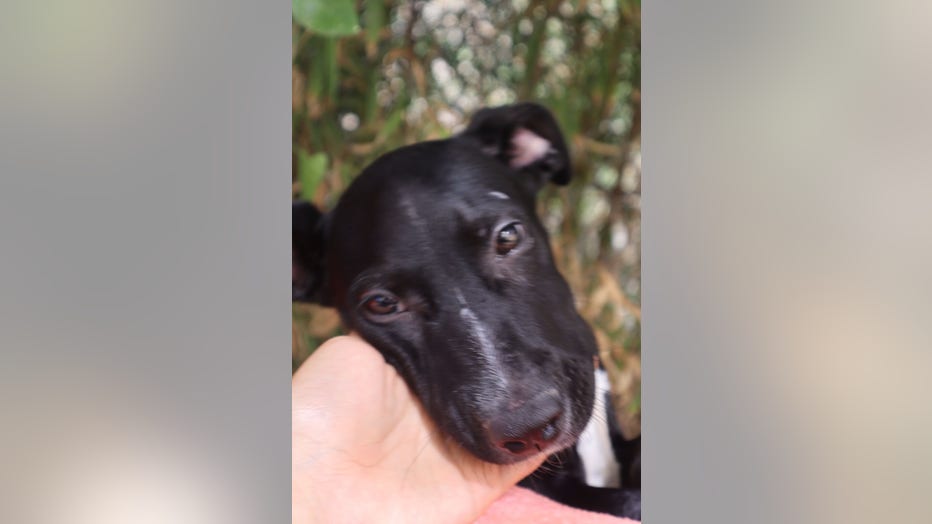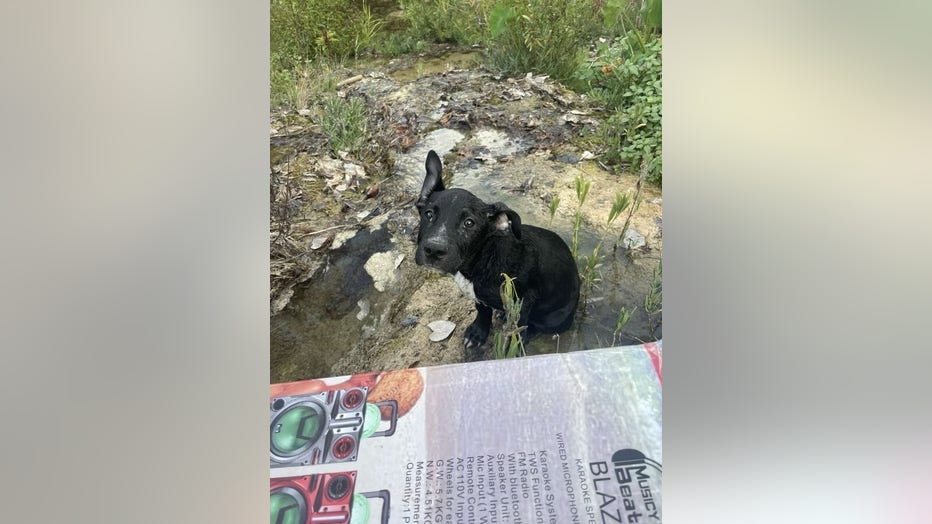Puppy found floating in box on Texas river rescued, available for adoption
AUSTIN, Texas - A puppy found floating down a Texas river in a box is now at Austin Pets Alive! and looking for his forever home.
APA! says that in early October, they received a call from another Texas shelter, saying a man had come in with a puppy he found floating in a box down the river and needed help the shelter couldn't provide.
The two-month-old black Lab retriever mix had tested positive for parvovirus, a highly contagious life-threatening virus. The man drove two hours to bring the puppy to APA!'s Puppy Parvo ICU, which treats around 1,000 puppies a year, according to the rescue.

A puppy found floating down a Texas river in a box is now at Austin Pets Alive! and looking for his forever home. (Austin Pets Alive)
When the puppy arrived, he was "crashing," says medical clinic manager Lauren Heymann—lethargic and pale, and needing immediate treatment. The puppy, later dubbed Kayak, was hospitalized and clinic staff and volunteers treated him while he was critical and administered antibiotics, IV fluids, medications for vomiting & nausea, and food via syringe.
Kayak was so sick that he didn't show any signs of his personality at first. But over the next five days, with careful tending, and a lot of treatment, Kayak got better, ate more, and grew to a whole 18 pounds, APA! said.
He became his true "happy, wiggly self," says Heymann. "Now he wants attention. He's wagging his tail. He's a sweet puppy, the typical happy puppy."
Kayak is available for adoption at APA's Town Lake Adoption Center.

After undergoing treatment for parvovirus, Kayak is now ready for adoption at Austin Pets Alive! (Austin Pets Alive!)
What is the Puppy Parvo ICU?
The Town Lake Adoption Center is home to the Puppy Parvo ICU, which helps APA! save lives from all over Texas. Over 90% of APA!'s parvo patients leave the ICU healthy and ready for new homes.
APA! says the Puppy Parvo ICU is the first of its kind in the nation and also hosts students to share knowledge and provide other shelters and rescues across the country with the information they need to help save dogs with parvo.
What is parvovirus?
According to the American Veterinary Medical Association, canine parvovirus is highly contagious and can affect all dogs, but unvaccinated dogs and puppies younger than four months old are the most at risk. The virus affects dogs' gastrointestinal tracts and is spread by direct dog-to-dog contact and contact with contaminated feces, environments, or people. The virus can also contaminate kennel surfaces, food and water bowls, collars and leashes, and the hands and clothing of people who handle infected dogs.
The virus is resistant to heat, cold, humidity, and drying, and can survive in the environment for long periods of time, says the AVMA. Even trace amounts of feces from an infected dog may contain the virus and infect other dogs. The virus is readily transmitted from place to place on the hair or feet of dogs or via contaminated cages, shoes, or other objects.
Some signs of parvovirus include:
- Lethargy
- Loss of appetite
- Abdominal pain and bloating
- Fever or low body temperature (hypothermia)
- Vomiting
- Severe, often bloody, diarrhea
Persistent vomiting and diarrhea can cause rapid dehydration, and damage to the intestines and immune system can cause septic shock, says the AVMA.
Most deaths from parvovirus occur within 48 to 72 hours following the onset of clinical signs, says the AVMA. Pet owners who see any of these signs are advised to contact their veterinarian immediately.
APA! says the best way to prevent parvovirus is to vaccinate dogs and puppies. Puppies can be given a 5-in-1 vaccine called DHLPP (which protects the puppy from distemper, hepatitis, leptospirosis, parvovirus, and parainfluenza) or a 4-in-1 DAPP (which protects against canine distemper, adenovirus type 2, parainfluenza, and the parvovirus) at their local vet. The first vaccine is ideally given between 6 and 8 weeks of age, with boosters given at 3-week intervals until the puppy is at least 4 months old.
APA! advises that until the vaccination series is complete, puppies should stay away from all potentially infected public ground, where other dogs have walked and fecal matter may be present, like dog parks, hike and bike trails, and sidewalks.

